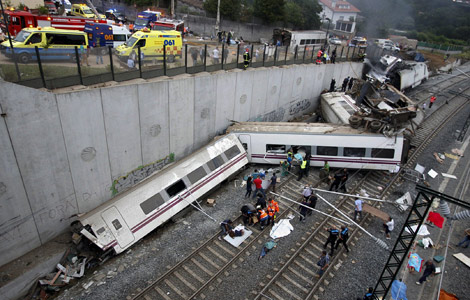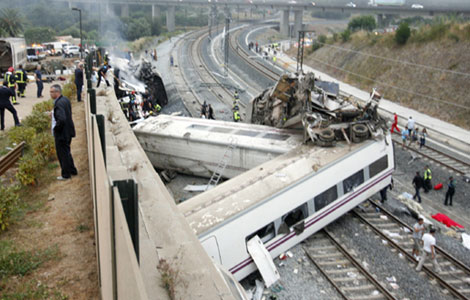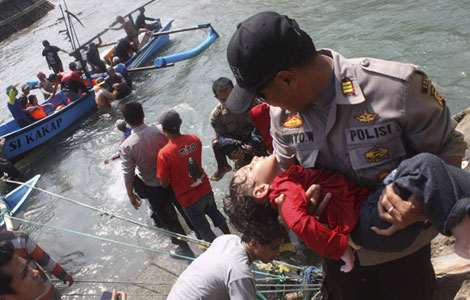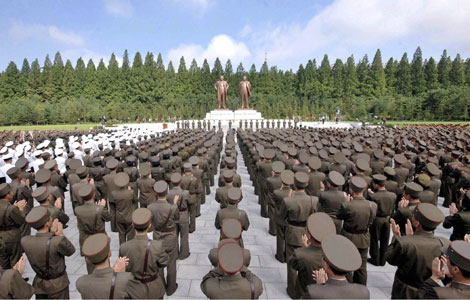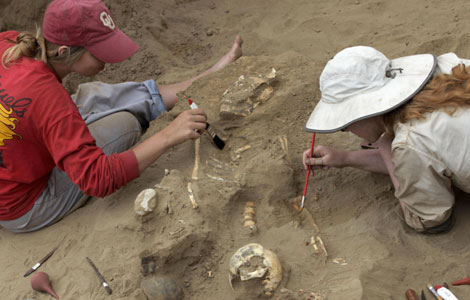

CAIRO - The military chief who ousted Egypt's elected president called on the public Wednesday to take to the streets to give him and the police a mandate to tackle "violence and terrorism," in an address that pointed to a possible move against supporters of the Islamist leader.
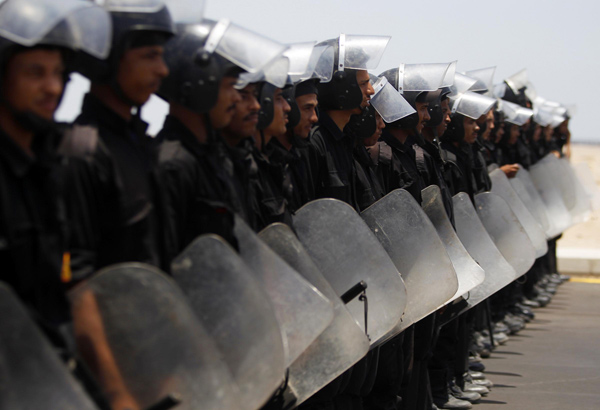 |
|
Riot police take position as they cordon off the road in front of the buses of Ultras, or hardcore fans, before the derby CAF Champions League soccer match between Egypt's Zamalek and Al Ahly at El-Gouna stadium in Hurghada, about 464 km (288 miles) from the capital Cairo July 24, 2013.[Photo/Agencies] |
The call by Gen. Abdel-Fattah el-Sissi, made in a speech to a graduation ceremony for military cadets, underlined how the military chief is the source of real power in the country despite the creation of a civilian government after the July 3 coup that removed Mohammed Morsi.
His comments appeared designed to secure a public cover for what could be a move to dismantle sit-in camps by Morsi's supporters in Cairo and elsewhere, as well as a campaign against Islamic radicals that have stepped up attacks on security forces in Sinai. El-Sissi called for a massive turnout in Friday rallies to give him a "mandate" to do what is "necessary" to stop bloodshed.
A coalition of Morsi's Muslim Brotherhood and allied factions denounced his speech, calling it an "open invitation" to civil war. Their coalition plans protests and marches of its own on Friday, raising the potential for violence between the two camps.
El-Sissi removed Morsi after four days of massive protests by millions of Egyptians demanding his ouster after a year in office, and the military says its goal is to set the country on a path to democracy. But the move has set top ally Washington in an uncomfortable position: The U.S. has implicitly accepted Morsi's removal, even while the Obama administration reviews whether it constitutes a military coup, which under U.S. law would require a shut-off of $1.3 billion in annual aid to Egypt's army.
On Wednesday, Washington announced it is delaying delivery of four F-16 fighter jets to Egypt as it conducts the review _ its first direct action in response to the ouster. Still, officials cautioned they had not yet decided whether to suspend military aid more broadly.
Since Morsi's fall, his Islamist supporters have taken to the streets vowing to continue protests until he is reinstated.
Clashes have erupted multiple times between the Islamists and Morsi opponents or security forces. Dozens have been killed, mostly from the pro-Morsi side, including more than 50 killed by troops during clashes outside a military facility in eastern Cairo.
Each side accuses the other of starting the violence. Throughout, the military and its allied media have depicted the protesters as a dangerous armed movement. The Muslim Brotherhood and its allies say their protests are peaceful. The group accuses troops or thugs hired by the Interior Ministry, which is in charge of the police, of attacking pro-Morsi rallies.
At the same time, Islamic militants have stepped up attacks on security forces in Sinai Peninsula since Morsi's fall, killing nearly 20 soldiers and policemen and raising fears of a wave of militant violence.
On Wednesday, suspected militants killed two soldiers and wounded three others in four separate attacks in Sinai. In a separate incident, three suspected militants were killed when their explosives-laden car blew up apparently prematurely just outside el-Arish, a coastal city in northern Sinai that is a stronghold of radical Islamists, security officials said, speaking on condition of anonymity because they were not authorized to talk to the press.
In the early hours Wednesday, a bomb went off outside the main police headquarters in the Nile Delta city of Mansoura, wounding 19 people. Presidential spokesman Ahmed el-Muslemani called the attack an act of terrorism.
The Mansoura bombing is a possible sign that a militant campaign could be spreading from Sinai to Egypt's heartland, where so far the violence has been mostly restricted to street clashes between the two sides.
El-Sissi's address in the Mediterranean coastal city of Alexandria was a strong sign that the top general is the source of real power in Egypt, despite his assertions that authority has been handed completely to the civilian government set up after Morsi's fall and led by interim President Adly Mansour.
Wearing dark sunglasses under his military cap and a uniform dotted with medals, el-Sissi said "every honorable and honest Egyptian must come out ... Please, shoulder your responsibility with me, your army and the police and show your size and steadfastness in the face of what is going on."
The populist rallying cry raised concern among some in the camp that supported Morsi's removal. An influential youth movement, April 6, said el-Sissi did not need a further mandate to stop any violence or armed groups, and it warned that measures that add to tensions only "keep us away from national reconciliation and constitute a real danger on national security."
But Tamarod, the new youth movement that spearheaded the mass rallies leading to Morsi's ouster, backed el-Sissi's appeal and said it would participate Friday. It said the purpose of its protests would be to press demands for Morsi to be brought to justice and to renounce violence.
A political adviser to Mansour, the interim president, depicted el-Sissi's call as aimed at defending the public, alluding to allegations of violence by Morsi supporters against opponents. "We are talking about a people who are subjected to aggression on the streets," Mustafa Hegazi said.
El-Sissi called for rallies Friday to be as large as those on June 30, when millions took to the streets at Tamarod's behest to demand Morsi's ouster, and July 3, when millions again celebrated his overthrow. He promised police and troops would guard the rallies.
He underlined that his call for mass demonstrations should not be taken as an invitation to violence.
At the main pro-Morsi sit-in in Cairo, outside the Rabaah al-Adawiya Mosque, the mainly Islamist protesters who have been massed there all month immediately saw el-Sissi speech as signaling a move to crush them.
"He was pleading to the people, (saying) ... 'I want to kill those criminals, those believers, those people who pray ... I can't even see what honor is since I am doused in treason,"' Gamal Abdel-Sattar, a pro-Morsi cleric, told the crowd in a speech from the stage, parodying el-Sissi.
Commenting on el-Sissi's address, Essam el-Erian, a senior Brotherhood leader, made it clear that the Morsi camp intends to stick to its guns. "There is no solution except rescinding the coup and the return of legitimacy," he told Al-Jazeera Mubasher Misr.
El-Sissi's address coincided with the inaugural session of a reconciliation conference sponsored by the interim president aimed at ending the country's divisions. The Brotherhood and its allies boycotted the session, attended by Mohamed ElBaradei, Egypt's top reform campaigner who was named vice president after Morsi's ouster, and several dozen senior politicians and public figures.
Hegazi, Mansour's adviser, later told a news conference that reconciliation could only come after individuals who broke the law are brought to justice, saying this was applicable to Sinai, the two Cairo sites where Morsi supporters have been holding protest sit-ins for about four weeks and Cairo's central Tahrir Square, birthplace of the 2011 uprising that toppled Mubarak and a favorite spot for liberals, women and members of the Christian minority.
Morsi's supporters insist he must be reinstated, branding his ouster as a coup against democracy. The former president was Egypt's first freely elected leader, but his opponents say he concentrated too much power in his own hands and his Islamist group, the Muslim Brotherhood.
El-Sissi said Wednesday that he has no intention, "not a for a second," to go back on a political road map outlined since Morsi's fall. That includes amending the Islamist-drafted constitution passed under Morsi, following by parliamentary and presidential elections by early 2014.
He promised foreign observers from the U.N. and the European Union would be invited to monitor the elections. "We are ready for an election to be supervised by the whole world," he said.


